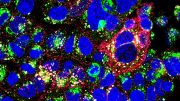
New research suggests exosomes, when coated with antibodies, can deliver therapeutic miRNA to targeted cells.
New research shows that naturally occurring nanoparticles called exosomes can be coated with an antibody to deliver therapeutic miRNA to targeted cells.
Using a novel form of immune-genetic therapy, researchers from Yale School of Medicine and the Jagiellonian University College of Medicine in Poland have successfully inhibited a strong immune allergic inflammatory response in the skin of mice. The results suggest the technique could be used to combat a variety of diseases.
“We use an antibody coating we chose to deliver therapeutic genetic material we selected to target cells,” said Dr. Philip Askenase, professor of medicine and senior author of the study published July8 in the Journal of Allergy and Clinical Immunology.
The delivery system consists of naturally occurring nanoparticles called exosomes that are about one thousandth the size of donor cells that release them. These tiny vesicles were once thought to contain only unneeded cellular debris. However, in the last decade, scientists have shown that there are billions of exosomes in the circulation and that they carry genetic instructions in the form of micro-RNAs (miRNA) to regulate the functions of nearby and distant cells.
Askenase and colleagues found that exosomes could be coated with an antibody of their choosing. These nanovesicles were able to deliver therapeutic miRNA to specific cells targeted by the antibody. In the current study, the coated exosomes delivered their miRNA cargo to immune system cells, inhibiting an active allergic disease response in the skin of mice.
“These natural nanoparticles are present throughout the body,” said Dr. Krzysztof Bryniarski of Jagiellonian University and lead author of the paper. “They seem to be a superior delivery system compared to artificial nanoparticles currently in use, which often are eliminated from the body because they are sensed as artificial.”
In theory, the researchers said, the natural nanoparticles coated with chosen specific antibodies and loaded with selected miRNAs could be used to specifically target and then genetically alter crucial cells involved in allergic conditions such as asthma, autoimmune responses, and potentially even cancers and neurological diseases.
The research was funded by the National Institute of Allergy and Infectious Diseases at the NIH (AI-00714 and 076366), and the Polish Ministry of Science and Higher Education (N401 092 31/2176 and K/ZDS/001429).
Reference: “Antigen-specific, antibody-coated, exosome-like nanovesicles deliver suppressor T-cell microRNA-150 to effector T cells to inhibit contact sensitivity” by Krzysztof Bryniarski, PhD; Wlodzimierz Ptak, MD; Asha Jayakumar, PhD; Kerstin Püllmann, MD; Michael J. Caplan, MD, PhD; Arthit Chairoungdua, PhD; Jun Lu, MD, PhD; Brian D. Adams, PhD; Emilia Sikora, PhD; Katarzyna Nazimek, MS; Susanna Marquez, MS; Steven H. Kleinstein, PhD; Panjamaporn Sangwung, BS; Yasuko Iwakiri, PhD; Eric Delgato, BS; Frank Redegeld, PhD; Bart R. Blokhuis, MS; Jacek Wojcikowski, PhD; Anna Wladyslawa Daniel, PhD; Tom Groot Kormelink, PhD; Philip W. Askenase, MD, 3 June 2013, The Journal of Allergy and Clinical Immunology.
DOI:10.1016/j.jaci.2013.04.048









Be the first to comment on "Naturally Occurring Nanoparticles Harnessed to Target Disease"